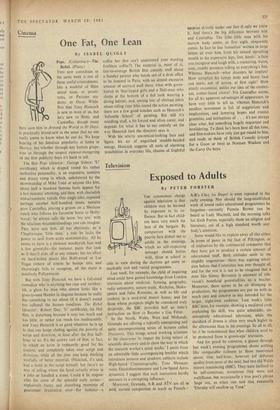Television
Exposed to Adults
By PETER FORSTER Last week, for example, the child of inquiring mind could have gained knowledge from London television about medicine, farming, geography, radio astronomy, nature study, fEschylus, Shake- speare and Jules Romains, as well as life and cookery in a medieval manor house; and for those whose prospects might be considered truly desperate, the BBC provided half an hour's instruction on How to Become a Gas Fitter.
In the North, Wales, West and Midlands. Granada are offering a typically enterprising and quite uncompromising series of lectures called Discovery. This brings actual working scientists to the classroom 'to impart the living nature of scientific discovery and to show the way in which the research worker's mind works.' I quote from an admirable little accompanying booklet which introduces lectures and speakers; subjects include High-Speed Cinematography, Time Measure- ment, Electroluminescence and Low-Speed Aero- dynamics. I suggest that such instruction hardly amounts to a corrupting influence. f Moreover, Granada, A-R and AtV arc all in avid, earnest competition to teach us French- A-R's Chez les Dupre is even repeated in the early evening. Nor should the long-established work of sound radio educational programmes be forgotten—currently Pamela Brown can be heard as Lady Macbeth, and the morning talks for Sixth Forms, especially thoge on religion and literature, are of a high standard worth any- body's attention.
Some would like to explain away all this either in terms of panic in the face of Pilkington, or of realisation by the commercial companies that they have got to produce a certain 'amount of educational stuff. Both attitudes seem to me stupidly ungenerous--there was aspiring televi- sion before that Committee was ever thought of, and for the rest it is not to be imagined that a man like Sidney Bernstein is unaware of tele- vision's beneficial potentialities as a teacher. ,Moreover, there seems to be no skimping in production; the programmes are put on with as much care and concern as any intended for the larger, night-time audience. Last week's little BBC item, for example, showing a medieval cook explaining his skill, was quite admirable, un- obtrusively educational television, while the standard of drama is often very much higher in the afternoons than in the evenings. So all in all, let it be remembered that what children need to be protected from is grown-ups' television.
And for proof by converse, a glance through last week's evening programmes shows nothing like comparable richness to those mentioned above. One half-hour, however (of different quality from most of the rest), had two old Welsh miners reminiscing (BBC). They were inclined to be self-conscious; sometimes they were just mellifluous, but occasionally a true poet's phrase leapt out, as when one said that eventually 'Eternity will swallow up Time.'






































 Previous page
Previous page